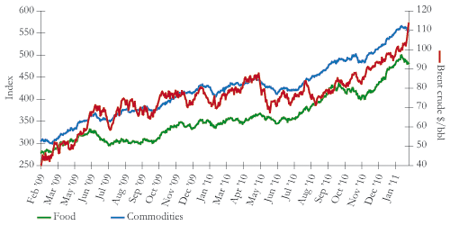There is a real risk that the explosion in food and energy prices will feed through to higher inflation across the board. A combination of slack monetary and fiscal policies, intended to encourage growth and inflation following the credit crisis, could transform exogenous shocks such as oil and commodity price rises into sustained higher levels of inflation in developed and emerging economies alike.
This will force central banks to tighten monetary policy and increase interest rates faster than previously expected. Economic growth will also be slower. So stagflation will rear its ugly head. Rising commodity prices can hit the global economy in three ways. First, they diminish real incomes. Second, they transfer resources out of oil-consuming economies to producers, who usually spend less of it and save more. Third, and more important, they increase inflationary expectations and lower growth projections, which reduce the value of financial assets. This wealth loss then reduces growth as much as the loss of real disposable income and consumption resulting from the so-called oil price tax.
Food commodity prices have jumped 40% in the past year as global supply constraints come up against increased demand, particularly in emerging economies. And now the democratic uprisings against the family dictatorships in the Middle East have spread to oil-producer states such as Libya and could go on to such countries as Algeria, Saudi Arabia and even beyond to Kazakhstan. As a result, the Brent crude oil price has spiked sharply to more than $110 a barrel.
| Food and commodities versus oil |
 |
| Source: Instrategy |
| The inflation impact of fiscal and monetary profligacy will offset the disinflationary effect of so-called output gaps |
This increases the risk of stagflation. Oil price rises might initially be the result of supply disruption and food price rises might just reflect extreme weather. But the transmission mechanism of these price shocks to the broader economy is not exogenous because the money to make rising inflation happen has already been printed. So the inflation impact of fiscal and monetary profligacy will offset the disinflationary effect of so-called output gaps. The existence of these output gaps is questionable anyway because after such a huge credit crisis resources have been misallocated and might not be useful in the post-crisis economy (for example, US construction cranes). Even at the best of times, output gaps are subject to such revision as to make them thoroughly useless as measures of economic slack. The UK is a case in point. It has oodles of spare capacity, a supine central bank and yet the highest inflation rate in the OECD.
Sustained rising inflation will cut real incomes and reduce OECD consumer spending growth. But it will also migrate into the inflationary expectations of wage earners, consumers and, above all, central banks. Central banks will bring forward monetary tightening. Already, several central banks have started to increase interest rates (Australia, Norway, Sweden, Israel), and Canada and the UK will follow soon. The European Central Bank is itching to raise interest rates once it feels confident that the eurozone sovereign debt crisis has been solved (at least for now) by some deal on emergency funding.
On the other side of the world, the impact could be similarly stagflationary. The Chinese authorities have failed to curb inflationary pressures with their weak monetary and fiscal measures. As in the west, real interest rates remain hugely negative, providing further fuel to a credit bubble and property prices. Corporate margins are being squeezed by rising prices for copper, food and energy imports.
The Chinese economy is set to slow and there will be an impact on the rest of Asia. Asia’s exports to China have grown in importance and are now the pivotal swing factor for the export-led economies of the region. And it won’t be just Asian economies that will suffer from this.
Higher inflation will ultimately reprice the mountain of debt used to finance the economic recovery. When it does, the economy will turn down and fears of deflation will resurface. But that is down the road. The next chapter is about higher global inflation and lower growth.
David Roche is president of Independent Strategy Ltd, a London-based research firm. www.instrategy.com